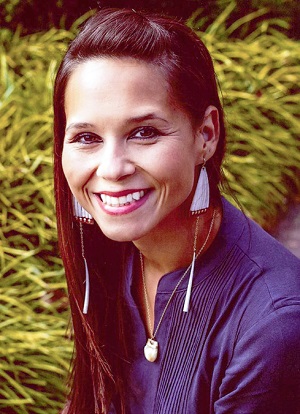
Citizen Potawatomi Nation’s Behavioral Health Clinic experiences very few “slow days,” a result likely related to the inadequate behavioral and mental healthcare services in the United States as a whole. Along with determined support from the tribal leadership and CPN Health Services, the behavioral health program has benefitted from the leadership of Dr. Glenna Stumblingbear-Riddle. In addition to her service as director, she serves as clinical director of Native Connections, an outreach program coordinator and is a licensed health services psychologist.
She has recently added one more title to her resume, when in May 2017 Dr. Stumblingbear-Riddle was appointed to the Oklahoma State Board of Mental Health and Substance Abuse Services. Her appointment marked a significant moment for tribal health services in the state. In many parts of the state, tribal health services, specifically those dealing with behavioral health and substance abuse treatment, are some of the only providers available and provide a relief on strained rural health systems.
The Hownikan spoke to Dr. Stumblingbear-Riddle, a citizen of the Kiowa Nation, about her appointment and what it means for Native American healthcare professionals in Oklahoma.
What kind of role does one play as a member of the Oklahoma State Board of Mental Health and Substance Abuse Services?
“The Oklahoma Department of Mental Health and Substance Abuse Services board ensures the quality of mental health and substance abuse programs across Oklahoma. It is an eleven-member board appointed by the governor and confirmed by the Oklahoma State Senate. My role on this board is to assist in setting broad policy pertaining to mental health and substance abuse services for Oklahomans.
“We know that many people who need mental health and substance abuse services do not get the help they need, so this board works to help reduce these types of barriers.
“Also, this board sets provider certification standards to ensure quality care throughout Oklahoma.”
You’ve been an advocate of the inclusion of tribal behavioral health professionals being included in state-level planning. Why do you think this is important?
“I think this is critical. In Oklahoma there are 39 federally recognized tribes and we have a high percentage of American Indians in our state. Therefore, it is vital that tribal behavioral health professionals be included in policy and other decision-making that will ultimately impact our communities.
“Sometimes decisions are made without long-term thought and are not consistent with the needs and values of the community. I’m honored to serve the state of Oklahoma and help share a collective voice for all who are negatively impacted by mental health and addiction. Mental health and substance abuse issues impact not only the individual but the family, community, economy, and state as a whole. We all have a role to play in helping to create a healthier Oklahoma. We cannot accomplish this without addressing the needs and gaps pertaining to mental health and addiction.
“I am very thankful for the support of the Citizen Potawatomi Nation and I am eager to serve the state of Oklahoma. I’m excited by this new endeavor and stay reminded of this quote by the late Chief Wilma Mankiller who said, ‘the secret of our success is that we never, never give up.’
“We can never give up on creating healthier communities. Our communities benefit when we are reminded of our resilience and that recovery is possible. We just need to help individuals and families have better access to it.”
If you would like to learn more about behavioral health services available through the Citizen Potawatomi Nation Health Services, please visit potawatomi.org/services/health or call (405) 214-5101.
